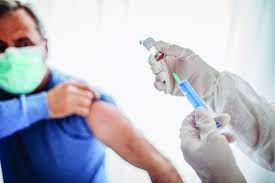Chronic lymphocytic leukemia (CLL) is a blood cancer that starts in the bone marrow and affects white blood cells called lymphocytes. It is the most common form of leukemia in adults.1
CLL often especially affects the B lymphocytes, which are a key part of the immune system. These are the cells stimulated by vaccines to make antibodies that fight against specific diseases, including COVID-19.
People with CLL have a high number of abnormal lymphocytes, and they may not respond to vaccines as effectively as people without CLL. They are also a group that is more at risk for severe COVID-19.2
This article will discuss how having CLL affects vaccine response, the recommendations for COVID-19 vaccination in people with CLL, benefits, and risks.
Woman with CLL prepares to get COVID vaccine booster
Vaccines and Health Conditions
Since the COVID-19 vaccine is new, more data needs to be collected to better understand how it works in people with blood cancers like chronic lymphocytic leukemia.
However, the Centers for Disease Control and Prevention (CDC) explains that the vaccine is considered safe for most people with underlying medical conditions. It’s also important to point out that people with underlying conditions may be more likely to develop severe symptoms from COVID-19.3
Having cancer, for instance, can increase your risk of getting very ill from COVID-19. Cancer treatment can also lower your body’s ability to fight off diseases.
What should you do if you have a serious underlying condition? Talk to your doctor. They may recommend getting the vaccine at a hospital or other location where you can be closely monitored.2 They can also discuss when you may need a booster shot.3
COVID-19 Vaccine and Blood Cancers
Should you get the COVID-19 vaccine if you have a blood cancer like CLL? The general consensus is yes. Clinical trials have shown the vaccine to be safe for those with underlying medical conditions, including people with cancer.
The Leukemia & Lymphoma Society (LLS) recommends that people with blood cancer get fully vaccinated against COVID-19.4 Three doses of the mRNA vaccine are recommended as the primary series for people who are immunocompromised. This includes people with blood cancers like CLL.
A booster is recommended in addition to the primary series.4 Vaccination timing may depend on whether you are currently receiving treatment for CLL. It’s important to discuss this with your treatment team.
People with CLL and other blood cancers are at greater risk of experiencing severe symptoms due to COVID-19.5 The CDC and LLS also recommend continuing to take protective measures, including frequent hand washing and social distancing.4
Additional protection is suggested because people with blood cancer may not receive total immunity from vaccination. Immunity from the vaccine may vary depending on the type of blood cancer and what type of treatment the person is receiving.
Keep Taking Precautions
The CDC recommends that older people and people with underlying conditions like CLL continue to take steps to protect themselves from COVID-19, regardless of their vaccination status. Protective steps include:
Wearing a mask
Social distancing
Frequent hand washing
If you have an underlying condition, you should also encourage people around you to get vaccinated.2
CLL Research
A 2021 clinical trial of patients with CLL showed that they had a significantly lower antibody response rate to the Pfizer-BioNTech mRNA COVID vaccine than people who didn't have CLL.6 The response was lowest in those patients undergoing treatment with Bruton's tyrosine kinase inhibitors or venetoclax with or without anti-CD20 antibody.
But research also suggests that a third dose of the vaccine may benefit blood cancer patients and survivors. Another 2021 study found that even those who did not develop antibodies after the first and second doses of the COVID vaccine developed antibodies after getting the third dose.7
However, it’s important to note that despite the promising results of this study, larger, controlled studies are required to better understand the benefit of a third dose in people with blood cancers like CLL.
Benefits
The COVID-19 vaccine protects against serious COVID symptoms. While some people with compromised immune systems and conditions like CLL may not benefit from complete immunity after the vaccine, the vaccine still provides some protection.
Risks
Research suggests that there is minimal risk involved in getting the COVID-19 vaccine for people with blood cancer.8 Some people may experience swollen lymph nodes after receiving the vaccine. However, this can happen whether or not you have blood cancer.
Other common vaccine side effects in people with blood cancer include:
Arm soreness
Pain at the injection site
Fatigue
Muscle aches
Headache
Less than 1% of vaccinated blood cancer patients experienced an allergic reaction to the injection.8
Because there’s a risk of breakthrough infection (getting COVID-19 even though vaccinated), especially in people with compromised immune systems, people with CLL should continue to wear masks and take other precautions to avoid infections.
